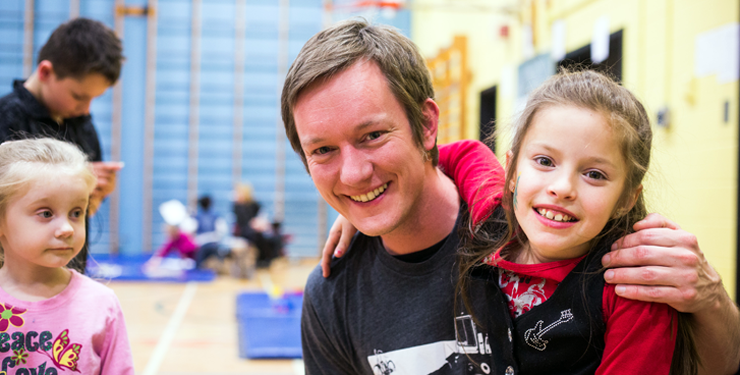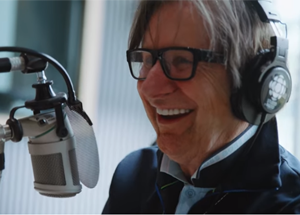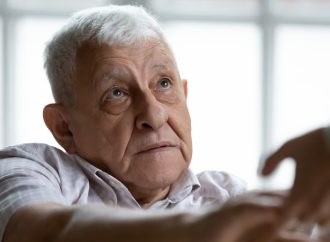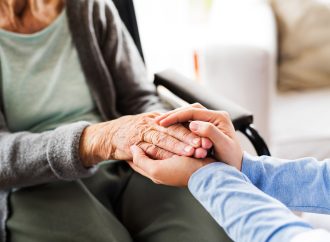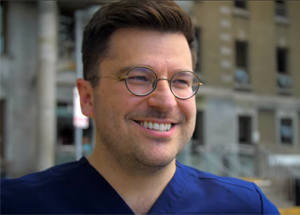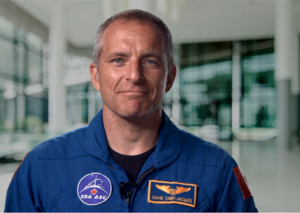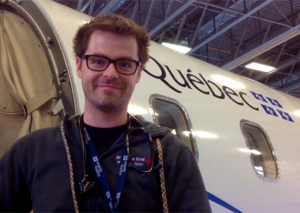 I met Dr. Samuel Harper during his talk about Social Pediatrics to McGill medical students. His practice and his leadership are inspiring and worth exploring in this issue!
I met Dr. Samuel Harper during his talk about Social Pediatrics to McGill medical students. His practice and his leadership are inspiring and worth exploring in this issue!
After completing his medical education at Université de Montréal in 2002, he did his Family Medicine residency at CLSC Des Faubourgs which he finished in 2004. He has always worked with a vulnerable clientele, but it was a stroke of luck that he embarked on the journey of opening a Social Pediatrics Centre in Centre-Sud in 2009. A decision that he has not regretted ever since.
Why did you choose Family Medicine instead of Pediatrics? Why Social Pediatrics?
“I personally hated my pediatrics rotation which is kind of ironic! In clerkship, I liked almost every rotation. I was interested in working with a vulnerable population such as homeless people, substance abusers, but was also into Obstetrics. I inherited all the children of my pregnant patients as my new patients which developed my interest in pediatrics. I became interested in social pediatrics because I believed that it was possible to do more for the suffering children that I was following as a family physician and who were excluded, abused, victimized, traumatized and neglected. I was convinced that a non judgmental approach that was more human, equal and global would allow me and my team to create a trusting relationship with these children and their families.”
Dr. Harper says that family medicine prepared him better to work in this field than any other training. Indeed, children are treated as a whole in social pediatrics because their social situation and social determinants of health are also addressed in addition to their medical problems. This goes back to the true essence of Family Medicine.
What is your practice like today and what do you like about it?
“I work two days a week in the Social Pediatrics Centre in Centre-Sud with a multidisciplinary team composed of a social worker, an art therapist, a psychosocial professional and a receptionist. The rest of my time, I work at the Saint-Luc Hospital Birthing Centre; follow pregnant patients at CLSC Des Faubourgs and work in the methadone and substance abuse program.”
Dr. Harper finds rewarding the strong relationship that he can build with the children and their families. He likes the challenge of complicated cases because it gives him the opportunity to work in an interdisciplinary fashion towards a common goal. “It is the only field where doctors and lawyers work conjointly”, he jokes. “I like the fact that we use holistic health services in an integrated fashion and linked to local resources in order to act on the social determinants of health and put in place the means to ensure that the rights of the children in the community are respected.” Moreover, he says that as a doctor, he has the power to make things move to protect children’s rights. He also enjoys creating possibilities for children to live successes and build their long-term trajectories.
What are the challenges faced in your practice?
Dr. Harper says that there are many challenges in this practice. Since it involves different intersectorial organizations, he finds it hard sometimes to coordinate appropriate care for his patients. For example, schools are difficult to deal with, he admits. As well, it is important to accompany the families and respect their choices without taking charge, which is sometimes hard according to Dr. Harper. Another challenge is that the system is extremely bureaucratized, making it tricky for families to access different services. However, Dr. Harper confesses that the hardest challenge is financing. Most of the Social Pediatrics Centre funding comes from donations and the uncertainty of whether this will be enough in the future is stressful.
It is important to adopt a holistic approach with your patients that targets causes and not only symptoms. A comprehensive approach centered on the needs of the individual and his context is extremely important.
Is there an additional training required to practice in this field?
“My practice in this field happened somewhat randomly. One day, I was offered the opportunity to open a Social Pediatrics Centre so I went for it. I did not really have additional training to practice in Social Pediatrics other than 2 days with Dr. Julien who is the founder of the Dr. Julien Foundation that is actively involved in this field. I know that there will be new accreditation centres to teach the approach in Social Pediatrics. Also, the Association des médecins francophones offers training modules. Other than that, I am not aware of any other available training.”
Do you have any advice for future family physicians?
“It is important to adopt a holistic approach with your patients that targets causes and not only symptoms. A comprehensive approach centered on the needs of the individual and his context is extremely important. This is what we do in Social Pediatrics by providing support to vulnerable children and their families to ensure their well-being, the optimal development of these children, the respect of their rights and their best interest.”
Thank you Dr Harper!
 Interview conducted by Carolina Capelle
Interview conducted by Carolina Capelle

